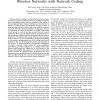Free Online Productivity Tools
i2Speak
i2Symbol
i2OCR
iTex2Img
iWeb2Print
iWeb2Shot
i2Type
iPdf2Split
iPdf2Merge
i2Bopomofo
i2Arabic
i2Style
i2Image
i2PDF
iLatex2Rtf
Sci2ools
128
click to vote
INFOCOM
2009
IEEE
2009
IEEE
Minimizing Delay for Multicast-Streaming in Wireless Networks with Network Coding
—Network coding is a method that promises to achieve the min-cut capacity in multicasts. However, pushing towards this gain in throughput comes with two sacrifices. Delay suffers as the decoding procedure requires buffering and is performed in batches of coded packets, and unfairness prevails in terms of delay increases between receivers with worse channel conditions and those with better channel conditions. In this paper, we focus on optimizing the delay performance in reliably multicasting a data stream to a set of one-hop receivers from the receiver perspective. We analyze the system based on queueing theory using semi-Markov chains from both the system-wide and receiver perspectives. We find that the average delay per received packet at the receivers’ end can be minimized by appropriate scheduling of data packets and appropriate size of the coding buffer, which depends on the rate of incoming data stream and capacities of the receivers. To circumvent unduly computational comp...
Related Content
| Added | 24 May 2010 |
| Updated | 24 May 2010 |
| Type | Conference |
| Year | 2009 |
| Where | INFOCOM |
| Authors | Wai-Leong Yeow, Anh Tuan Hoang, Chen-Khong Tham |
Comments (0)

